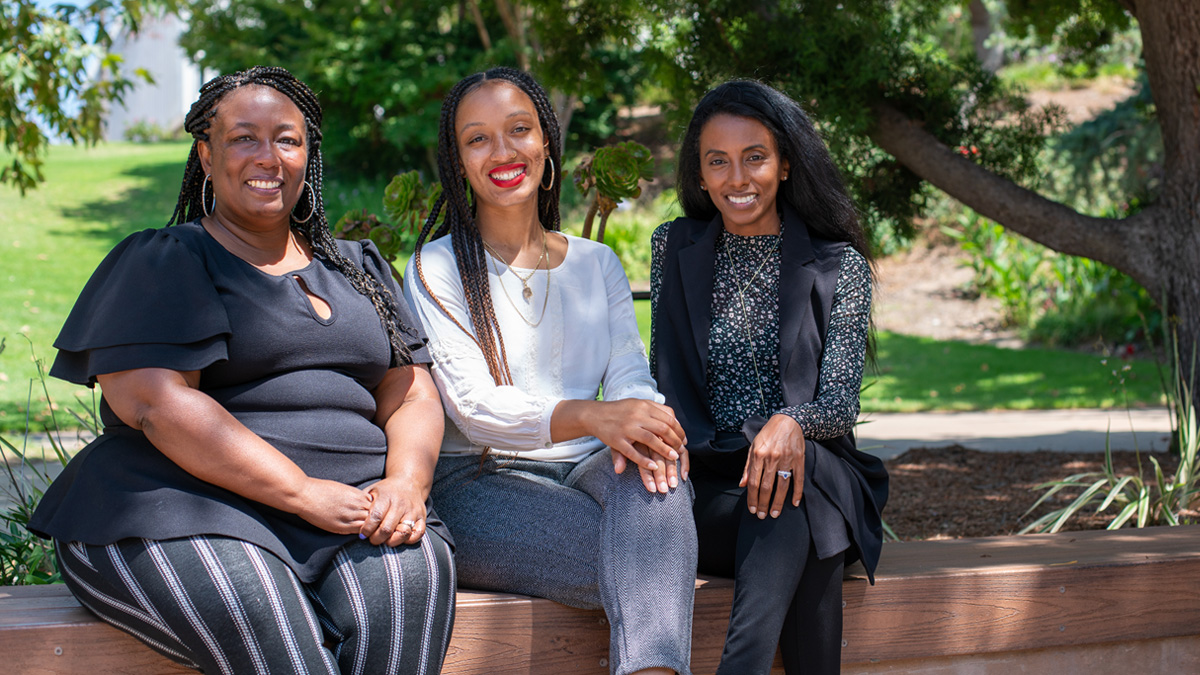 |
| The CCBMW leadership team from left: Candea Mosley, Myra Hollis and Sesen Negash. |
San Diego State University alumnus Ojore Lateef Bushfan (’07, ’09, ’15) intimately understands the importance of having Black wellness providers available to meet the needs of the Black community. That knowledge comes not only from his vocation as a marriage and family therapist, but also as a Black man who himself finds empowerment through therapy.
“As a client who's worked with an African American practitioner, it feels nice to be able to talk to someone who gets it — who understands the experience,” said Bushfan, a graduate of the College of Education’s Community Based Block and Marriage and Family Therapy master’s programs. “I think it provides an opportunity for folks of African descent to lean into this thing called therapy, because it's very vulnerable, disclosing painful things. Rapport is important.”
Bushfan also knows how difficult that can be — especially in a city like San Diego where the community of Black providers can seem scattered and disconnected.
“Oftentimes, when I’ve had to refer a Black client to another provider, it’s been hard,” Bushfan said. “It’s a lot of ‘This person's not in practice,’ or ‘This person's full.' I’ve even talked about how I wish I had a hub of Black identified mental health providers just to get an idea of who’s out there.”
That hub of Black wellness providers now exists at SDSU — it’s called San Diego Community Connections for Black Mental Wellness (CCBMW).
An initiative of the Center for Achieving Black Wellness and Anti-Racist Education (CABWARE), CCBMW launched late last year. The collective works to provide direct support to Black providers, including educators, counselors, psychologists, psychiatrists, social workers, mental health advocates and outreach workers.
Sesen Negash, associate professor in the Department of Counseling and School Psychology and co-director of CABWARE, said that Black providers often carry the weight of feeling isolated professionally while serving a community that has often felt overlooked and unseen by the wellness profession. She hopes that better connecting providers will lead to better services and experiences for members of the Black community.
“We do work that's really hard work — it's emotionally intensive and it's important,” said Negash, a licensed marriage and family therapist. “But oftentimes, we're doing it on our own. And when you're doing that work alone, that can really take a toll.
“Even though we know we have more of a community out there, we haven’t had access to one another — a bridge to bring us together. The hope of CCBMW is to bring people strength and community and find ways to replenish themselves by building these connections.”
Since its first meetup in December, 2021, CCBMW has engaged dozens of Black providers. Programming — including an in-person bi-monthly book club held in person, virtual bi-monthly community check-ins and bi-monthly guest speakers on wellness-related topics — aims to build community and exchange ideas.
“Attending the initial meeting was really cool, because I was able to see that there are a lot of Black mental health providers in San Diego,” Bushfan said. “We've got MFTs, licensed clinical social workers, psychologists and a school psychologist, as well. Having such a broad range of folks in this space adds to the richness of the experience for each participant. Hopefully, in the long run, I think it will make me a better therapist.”
Learn more about the CCBMW community and the Black wellness community by visiting the collective’s website, which includes monthly spotlights on Black wellness providers in the San Diego community.
